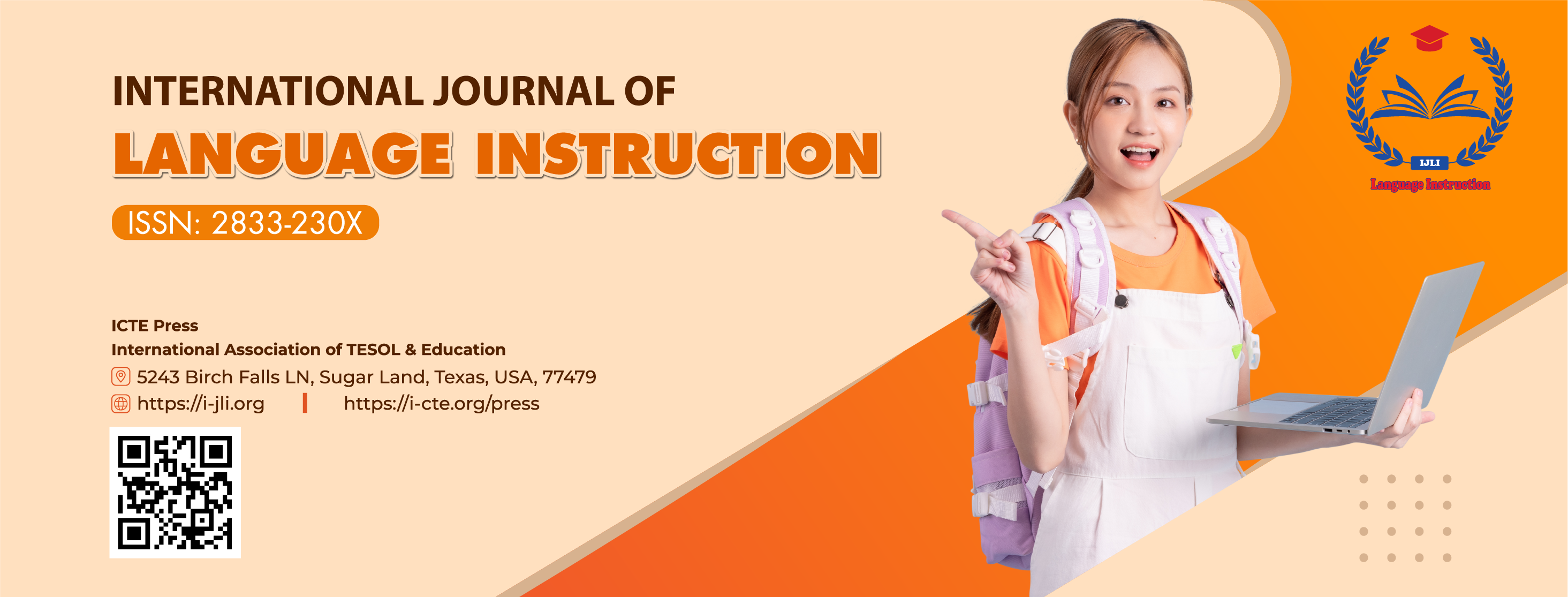Effects of Students’ Awareness on Developing Young Learners ‘listening skills at a foreign language center in Tra Vinh Province
DOI:
https://doi.org/10.54855/ijli.221111Keywords:
Keywords: Listening skill, challenges, solutions, teaching EnglishAbstract
During the integration period, English is rapidly asserting its importance. Four key abilities — listening, speaking, reading, and writing — are required to learn a language properly. The most important and challenging of these is listening. This current study was conducted to investigate the factors affecting the listening skills of young learners. The purpose of the study is to find out the factors that can help students improve their listening skills in particular and learn English well in general. The study was conducted at a language center in Tra Vinh province with the participation of 25 students from 12 to 15 years old who answered questionnaires about activities that can help students improve their listening skills. The Statistical Package for Social Sciences (SPSS) was used to analyze the data. The results show that many positive factors can help students develop listening skills, in addition to technology tools, students' awareness is an important factor. Besides, English outside the class (foreign language center) also helps students a lot in developing listening skills.
References
Balaban, S. (2016). The effect of summarization as a pre-listening technique at university preparatory classes. American Journal of Educational Research, 4(1), 126–133.
Holden, W. R. (2004). Facilitating listening comprehension: Acquiring successful strategies. Bulletin of Hokuriku University, 28(3), 257–266.
Hosogoshi, K. (2016). Effects of Captions and Subtitles on the Listening Process: Insights from EFL Learners’ Listening Strategies. JALT CALL Journal, 12(3), 153–178.
Karimi, F., Chalak, A., & Biria, R. (2019). Pedagogical Utility of Pre-Listening Activities for Improving Iranian Elementary EFL Learners’ Listening Comprehension. International Journal of Instruction, 12(1), 1127–1140.
Le, X. M., & Le, T. T. (2022). Factors Affecting Students’ Attitudes towards Learning English as a Foreign Language in a Tertiary Institution of Vietnam. International Journal of TESOL & Education, 2(2), 168–185. https://doi.org/10.54855/ijte.22229.
Liubinienė, V. (2009). Developing listening skills in CLI. Kalbų Studijos, 15, 89–93.
Lokanita, N. K. T., Rismadewi, N. W. M., & Dewi, L. M. T. (2020). Role Of Video as A Teaching Media to Improve Students’ Listening Skills. The Art of Teaching English as a Foreign Language, 1(2), 13–18.
Nguyen, N. T. T. (2021). A review of the effects of media on foreign language vocabulary acquisition. International Journal of TESOL & Education, 1(1), 30–37. Retrieved from https://i-jte.org/index.php/journal/article/view/5.
Nguyen, T. D. T., & Pham, V. P. H. (2022). Effects of Using Technology to Support Students in Developing Speaking Skills. International Journal of Language Instruction, 1(1), 1–8. https://doi.org/10.54855/ijli.22111.
Pham, M. T., Luu, T. T. U., Mai, . T. H. U., Thai, T. T. T., & Ngo, T. C. T. (2022). EFL Students’ Challenges of Online Courses at Van Lang University during the COVID-19 Pandemic. International Journal of TESOL & Education, 2(2), 1–26. https://doi.org/10.54855/ijte.22221.
Pham, T. C. (2022). Effects of Using Technology to Engage Students in Learning English at a Secondary school. International Journal of Language Instruction, 1(1), 86–98. https://doi.org/10.54855/ijli.22118.
Renukadevi, D. (2014). The role of listening in language acquisition; the challenges & strategies in teaching listening. International Journal of Education and Information Studies, 4(1), 59–63.
Rinkevičienė, I. A., & Zdanytė, J. (2002). Raising students’ awareness in language learning. Kalbų Studijos, 3, 96–100.
Sultana, F. (2014). Efficacy of Outside–Classroom English Language Learning: A Study of Intermediate Bengali Medium Students Studying English at Tertiary Level in Bangladesh. International Journal of English Language Education, 2(2), 28–35.
Tran, T. Q., & Duong, T. M. (2020). Insights into Listening Comprehension Problems: A Case Study in Vietnam. PASAA: Journal of Language Teaching and Learning in Thailand, 59, 77–100.
Tu, T. H. P. (2022). The Effects of Using Education Technology Tools on Learning Grammar for Students in Secondary School. International Journal of Language Instruction, 1(1), 41–52. https://doi.org/10.54855/ijli.22115.
Downloads
Published
Issue
Section
License
Copyright (c) 2022 Tran Thi Hong Nhi

This work is licensed under a Creative Commons Attribution-NonCommercial 4.0 International License.
The copyright of all articles published in the International Journal of Language Instruction (ijli) remains with the Authors, i.e. Authors retain full ownership of their article. Permitted third-party reuse of the open access articles is defined by the applicable Creative Commons (CC) end-user license which is accepted by the Authors upon submission of their paper. All articles in the ijli are published under the CC BY-NC 4.0 license, meaning that end users can freely share an article (i.e. copy and redistribute the material in any medium or format) and adapt it (i.e. remix, transform and build upon the material) on the condition that proper attribution is given (i.e. appropriate credit, a link to the applicable license and an indication if any changes were made; all in such a way that does not suggest that the licensor endorses the user or the use) and the material is only used for non-commercial purposes.
Authors are able to enter into separate, additional contractual arrangements for the non-exclusive distribution of the journal's published version of the work (e.g., post it to an institutional repository, in a journal or publish it in a book), with an acknowledgment of its initial publication in this journal.











